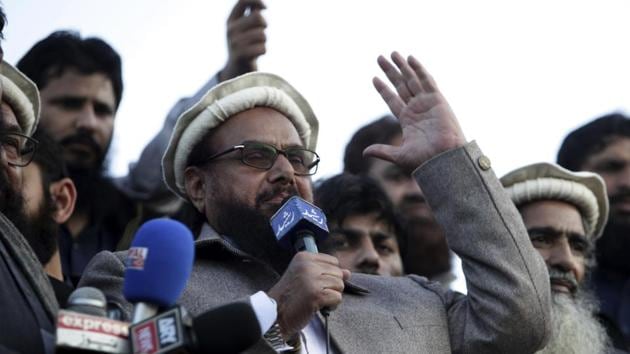UN rejects Hafiz Saeed’s plea on removal from terror list
The UN has rejected a petition by Hafiz Saeed, the founder of the Pakistan-based Lashkar-e-Taiba (LeT), to be removed from a list of sanctioned terrorists.
The UN has rejected a petition by Hafiz Saeed, the founder of the Pakistan-based Lashkar-e-Taiba (LeT), to be removed from a list of sanctioned terrorists, with authorities concluding that he wasn’t able to prove he did not pose a threat to other countries.

The move comes days before the March 13 deadline for objections to a fresh move by France, the US and Britain to sanction Jaish-e-Mohammed (JeM) chief Masood Azhar, another Pakistan-based terrorist, at the UN’s Islamic State and al-Qaeda Sanctions Committee.
The UN has already designated JeM a terrorist organisation. Saeed, who currently heads the Jamaat-ud-Dawah (JuD) that was banned by Pakistan on Tuesday, petitioned the UN in 2017. He was listed on December 10, 2008 by the UN Security Council after a terror attack in Mumbai by a group of LeT operatives claimed 166 lives.
After he filed his petition through the Lahore-based law firm Mirza and Mirza, it was taken up by Daniel Kipfer Fasciati, the ombudsman for the UN sanctions committee. The UN conveyed its decision to Saeed’s lawyer Haider Rasul Mirza on Wednesay. Saeed’s lawyer contended his client was not found guilty by any Pakistani court, but the ombudsman concluded this was insufficient to conclude the JuD chief didn’t represent a terrorist threat to other countries.
The ombudsman’s report, accessed by HT, noted, “From the reasonable decision by the Pakistani judiciary to lift the petitioner’s [Saeed] house arrest, the petitioner can only [say] that he does not represent a security or terrorist threat to Pakistan…”
It added, “The Pakistani court only had this question before it. The court did not pronounce itself – and in fact, neither should nor could pronounce itself – on whether the petitioner could pose a terrorist threat outside Pakistan. But if any, the latter seems to be the case.
The petitioner cannot deduce anything else from this other than the judicial exclusion of him posing a terror threat to Pakistan…” The report was also categorical that Saeed’s “argument of dissociation with LeT was not credible”. The report concluded, “He [Saeed] will continue as a listed individual.”
“The ombudsman’s report was endorsed by the UN sanctions committee,” an Indian official said on condition of anonymity. He added the ombudsman and the sanctions committee also “concluded Saeed was still the chief of the JuD, even after its ban”.
The US, Britain, France, Afghanistan and India opposed Saeed’s delisting in separate submissions. India has handed over to Pakistan several dossiers detailing the role of Saeed and LeT in the 2008 Mumbai attacks, but Pakistan has responded by saying he had been cleared by Pakistani courts and that India needs to provide more evidence.
Officials said Pakistan, where Saeed lives and operates freely, did not oppose his petition and also refused to cooperate with the ombudsman’s office and to grant visas to a UN team to visit the country to question the JuD chief. The ombudsman conducted a video teleconference with Saeed through an interpreter.
The report said, “Interviews undertaken by video-conference restrict the ombudsperson’s holistic observation of the petitioner regarding important indices of credibility, such as body language, tone, facial expression and the like. Should a similar situation of non-issuance of visas emerge in the future…I will request the Committee to authorise travel ban and asset freeze exemptions to enable the petitioner to be interviewed in a third country.”
Islamabad’s silence was clearly not a sign of its opposition to Saeed’s delisting — “else they would have said so in writing as India and the others” — but one of acquiescence with his petition, officials said. “All this happened on the watch of the current government,” said a person, adding, “Imran Khan’s new Pakistan is no different from the old Pakistan.”
At the time of Saeed’s listing, the UN Security Council said he was involved in the financing, planning, facilitating, preparing or perpetrating the activities of LeT and al-Qaeda. It added he was trained in Afghanistan and had been in touch with Abdullah Azzam, the mentor of slain al-Qaeda chief Osama bin Laden.
The US, which has offered a bounty of $10 million for Saeed, had warned Pakistan of “repercussions” after he was released from house arrest in 2017.



